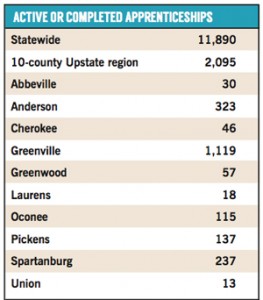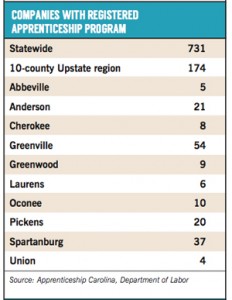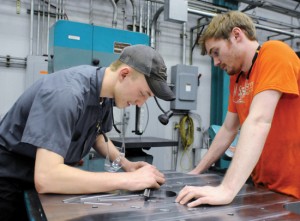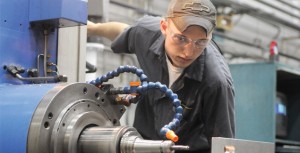by Robbie Ward | Upstate Business Journal | 7 May 2015
Programs give real-world experience to tomorrow’s workers
Blue Ridge High School senior Travis Tate wakes most mornings at 5:30, early enough to arrive at United Tool and Mold, where he participates in a nationally recognized model for high-skill employee recruitment and development.
The Taylors resident operates industrial equipment while other students slap snooze buttons on their alarm clocks. He continues working most days after his fellow students have left school to return home.
Like his father and older brother before him, Tate, 17, plans a career in the high-skilled labor field and started early as part of the youth apprenticeship program at the Upstate industrial supplier support company.
“Here you see what activity happens in the real world,” he said recently, taking a break inside United Tool and Mold’s Duncan facility. “This is the industry I’d like to be in.”
A few high-tech computerized machines away on the shop floor, Rickey Hooper, 46, facility manager for the Duncan location, explained the value of young apprentices nearly 30 years his junior learning the trade. He learned in a similar way as a high school senior in 1986.
“In our trade, it’s hard to go out and find skilled labor that we need because we’re so specialized,” he said. “We can get young workers and train them to be what we need.”
The company has 12 apprentices total at the Easley and Duncan operations. Two years out of high school, employees who complete youth and adult apprenticeships can earn about $43,000 annually.
Nationwide attention
United Tool and Mold may not have the household-name status of companies like Michelin, BMW and other larger corporate players in the Upstate. However, the company’s apprenticeship programs have received an impressive amount of national media attention from news organizations including Bloomberg News, The New York Times, PBS NewsHour, CNN and National Public Radio.

Thanks to Apprenticeship Carolina, a South Carolina Technical College System program launched in 2007, the number of companies with registered apprenticeship programs has skyrocketed. When the program started, South Carolina had about 90 participating companies, a tiny fraction of the 728 with apprenticeships registered in the Palmetto State as of early April.
State and federally registered apprenticeship programs have three parts: on-the-job training, job-specific education and a plan to increase workers’ wages as they progress through their apprenticeships. South Carolina companies receive tax credits of $1,000 per employee apprentice, renewable for up to four years while the apprenticeship continues.
Companies can register apprenticeships among 1,061 different occupations, ranging from an accordion maker to an X-ray equipment tester. The fields with the most apprenticeships in the Upstate include pharmacy technician, maintenance technician, machine operator, electromechanical technician, computer numerically controlled machine operator, machinist and electrician.
Nearly a quarter of the state’s companies with apprenticeship programs operate in the Upstate region of Abbeville, Anderson, Cherokee, Greenville, Greenwood, Laurens, Oconee, Pickens, Spartanburg and Union counties. Apprenticeship Carolina data shows 2,095 people who have completed or currently enrolled in apprenticeship programs. Statewide, the number climbs to 11,890.
‘A demand and supply that makes it work’
Nicholas Wyman, CEO of the New York-based Institute for Workplace Skills and Innovation, has traveled internationally to learn about the success of apprenticeships in throughout the world. His book, “Job U,” published in January by Random House, examines the intersection between unfilled jobs, people looking for work and the need for more high-skilled job training. His research for the book took him to the Upstate.
Wyman considers South Carolina, particularly the Upstate region, a national model for apprenticeships, thanks to collaborative partnerships among economic development, government, industry, kindergarten through high school and technical college leadership.

“People outside of the United States regard South Carolina as one of the leading states related to apprenticeships and what could be accomplished,” he told UBJ. “You’ve got a demand and a supply that makes it work.”
Apprenticeship Carolina works with each company to create an apprenticeship program with educational curriculum catered to specific needs. Carla Whitlock, Apprenticeship Carolina consultant for the Upstate, said the organization within the state technical college system completes paperwork on behalf of companies interested in starting apprenticeship programs. This removes worries for companies concerned about mounting red tape or spending lots of time completing related documents.
“That’s one of the things that makes Apprenticeship Carolina so successful,” Whitlock said. “We take away the burden of paperwork from the company.”

Experience first
Cynthia Eason, vice president for corporate and economic development at Greenville Tech, said partnerships throughout the region help individuals acquire more attractive job skills, help employers attract and retain higher-skilled workers, and generally increase the wealth and overall quality of life in the region.
“No matter the job, you want employees to have experience before they’re turned loose doing it,” Eason said. “This is a great way to do that.” She anticipates more job apprenticeships in the region in information technology and health care fields based on job-sector growth.
State and federal data exists for registered apprenticeships; however, many more job training and workforce development programs exist to train new and current employees. For instance, at General Electric’s gas turbine manufacturing facility in Greenville, the company has co-op and apprenticeship programs associated with Greenville Technical College but not registered with the state.
Spartanburg native Ron Lowery, 38, served in the Marine Corps and then worked as a maintenance mechanic before starting a co-op with GE in January 2014. He took wielding and fabricating classes at Greenville Tech while also working at industrial employer during the week.
Five months later, Lowery has a full-time job at GE. Appreciating the time with seasoned employees as he learned his trade, the welder said the company has earned his loyalty; however, the co-op ending didn’t stop his learning.

“Everyday I still ask plenty of questions and try to learn what I can,” he said. “I feel like the sky is the limit.”
Another veteran, Malcolm Fuller, 32, who served in Iraq during his time in the Navy, expects to complete a machine tool technologies apprenticeship at GE in this month. He said he feels grateful for the opportunity to simultaneously learn and work for the company.
“They really encourage you to go further with your education,” he said.
Skills hub of the future
As the state and Upstate continue to find distinction for developing employees from within, Wyman – the apprenticeship researcher, advocate and author – believes the effort will help attract more high-skilled jobs and employers.
“I think in five to 10 years we’re going to see this part of South Carolina known as the skills hub when other areas aren’t prepared for these skills changes,” said Wyman, who has a MBA from Harvard Business School.
Back at United Tool and Mold, production administration manager Jeromy Arnett said he and other leaders at the company approach apprenticeships as critical to bridging current success to the future.
“We have to get that tacit or tribal knowledge passed from one generation to the next,” he said. “You do that by pairing the older workers with the younger ones.”
Travis Tate, one of the company’s apprentices, said he looks forward to a career with the company.
“They’re giving me the opportunity I wouldn’t have if they weren’t here,” he said. “I highly appreciate and respect that.”

Online article location:
http://upstatebusinessjournal.com/news/apprenticeships-help-build-upstate-skills-hub/

